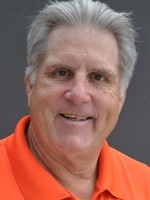After 40 years of coaching at the middle school, high school and collegiate levels, head golf coach Ed Bull retired on May 31.
Bull, who took control of the men’s and women’s golf programs in 2007, said it was time to move on to something new after being in the profession for so long.
“It’s a situation where I think that I’ve done all that I can do,” he said. “I’ve got other things that I would like to do … It’s time for me to do something else.”
Athletic director Bill Pettit said that Bull had made the department aware last month that he was going to retire, but he didn’t want the decision to be announced until after the awards banquet athletics holds every year. Pettit said he is happy that Bull will get a chance to take a break from coaching both the men’s and women’s golf teams.
“He was the first full-time (golf coach) and I thought he did a good job,” Pettit said. “He stayed within the rules of the NCAA and got kids that could come in here and be a good student-athlete, so I thought he did a good job of managing the program and I’m really excited that he’s got an opportunity to take a step back and rest a little bit.”
After playing football at Howard Payne University, where he was an All-Lone Star Conference player three years in a row, and a stint in the Canadian Football League, Bull started coaching in 1976 when he became the head track coach and assistant basketball coach at Farmersville High School.
Since then, he has coached everywhere from Highland Park to an international school for Americans in China.
Bull said one of the most challenging parts about coaching at UTD was trying to incorporate athletics into university life. He said there have been times when the support system for athletics didn’t function how it should have.
“We have people in the administration that come over and try to talk to us and tell us how to recruit,” he said. “It’s like, ‘You know, there’s a lot more to this.’… We need to understand that there’s a support agency and then there’s coaches.”
While Pettit said he understands that individuals can have problems with how the university handles the athletic program, he doesn’t think there is a problem with how the two cooperate.
“I think they do quite a bit,” he said. “Look at the other programs within the department and how successful they are … I think there’s enough here to be successful, but I can see where maybe he compares it to some other programs that have other resources that we’re not at yet.”
Bull, who has taught high school courses in physics, chemistry, geology, biology, English, journalism and government, said he has plans to work in something involving environmental science.
He got hands-on experience working in this field when he went to help with relief efforts in the aftermath of Hurricane Katrina. He was sent to Long Beach, Miss., where the eye of the storm made landfall. Bull said the devastation there was unbelievable.
“There were houses right there by the coast,” he said. “Beach houses, nice, big, kind of open houses. They’re not there (anymore.) They were slabs.”
He said taking on projects like this that help other people is one of his main callings.
Even though the men’s golf team hasn’t made it to the NCAA tournament since 2003 and the women’s team has never made it, Bull said he sees potential in the group that will remain at UTD.
“I think the women have a really good shot,” he said. “The people that were recruited, when they come in, they’re going to be very helpful. The bad thing about it is, what we shot at conference and finished this year, when I first started that would have won conference. Now it’s just a different game.”
Now that the job is officially open, there will be a national search for a replacement for Bull. Pettit couldn’t comment on any leads into the search, but he said he is hopeful the department can find someone who can improve the program.
“Now we’ll be able to post (the job opening) and then go out and do a national search and see who we can find that will be able to continue to improve the program,” he said.
Even though he is leaving, Bull said he believes the program is in good hands and he will miss his interactions with the players and other coaches the most.
“If you do what we do, it’s a very finite set,” he said. “There’s not many people that do what we do…Because all of us are competitive and we’ve all been there and competed. How you get to that point is different. We all talk about it, we exchange ideas… It’s a comradeship.”




